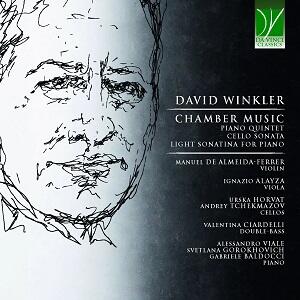
David Winkler (b.1948)
Piano Quintet (2013)
Cello Sonata (2010)
Light Sonatina for piano (2020)
rec. 2010, New York City; 2020, London
Da Vinci Classics C00716 [58]
David Winkler is a known quantity in some circles. If his name is not known to you then his website is there to be consulted and there’s a generous Naxos American Classics disc (8.559383) of his Piano Concerto and another concerto, Elements Concerti (I have not heard this).
The booklet accompanying this disc, which is in English only, discourses on the works and artists bound up in this project. There’s no scene-setting about Winkler. Now in his seventies, he is an alumnus of Columbia University in New York City and has studied at Conservatorio Cherubini in Florence, Italy and University of California, Los Angeles. Commissions from across the globe have not been in short supply. He has also benefited from a Leonard Bernstein Composer Fellowship, a Fromm Foundation Commission, the BMI Young Composer Award and a special ASCAP award. He has been Composer-in-residence with the Aspen Music Festival, the Banff Centre, Opera/Omaha (1996 and 1997), the Chautauqua Opera and the Lincoln Center Institute. His worklist bristles with five symphonies, six operatic works, pages and pages of concertos and chamber music including three string quartets. He has written a lot.
We are here afforded one hour in the company of Winkler’s chamber music. The half-hour Piano Quintet is in three movements and was commissioned by the Martha Argerich Festival (Lugano, Switzerland). It’s a work of the utmost seriousness, which is not to say stolid or dull. It plunges the listener into an exhaustingly thicketed forest. The wind does indeed ply the saplings double: “The tree of man was never quiet”. With music that is redolent of Shostakovich and Weinberg, Winkler maintains the pounding intensity even when he allows the music some pianissimo. The middle Adagio is an oasis of not-quite calm and seems to trace the halting progression of our anti-hero looking over his or her shoulder. Is there something wicked this way coming? In fact, as it progresses this movement attains a hard-won beauty. In the final Allegro – cf the opening Allegretto – there is more of that pressurised intensity. Gentler tributaries are incoming this time – seemingly from the Adagio. Torment wins out over any more self-effacing emotional material. At the end a great assertion of power arises.
The impassioned playing and language that typifies the first two of these three works plays well to the Russian influences already mentioned. However in the case of the single-movement Cello Sonata this is mixed with a voice uncannily close to that of the Beethoven of the Waldstein and Appassionata. Another influence emerges from this work, written three years before the Quintet. That is a singing Chopin-like line, but even that is subjugated by Winkler’s currency of tormented passions in the final pages. The little Light Sonatina to some extent comes as we have paid the price with the tormented emotions that play to the high cordillera of the Cello Sonata and the Quintet. Even then the ‘light’ does not denote relaxation – or perhaps it does by comparison with the other two works.
The sound, which is uniform across the three works, is exceptionally vivid and has an impact that reaches out and ‘invades’ the listener’s personal space. As for the musicians, it is a tribute to the composer and to them that I can easily imagine these works being tackled by the likes of Richter, the Borodin and Beethoven Quartets and Rostropovich in all in their super-octane Soviet days.
Rob Barnett
Availability: Da VinciPerformers
Quintet: Alessandro Viale (piano), Manuel De Almeida-Ferrer (violin), Ignazio Alayza (viola), Urška Horvat (cello), Valentina Ciardelli (double bass)
Sonata: Andrey Tchekmazov (cello), Svetlana Gorokhovich (piano)
Sonatina: Gabriele Baldocci (piano)


















